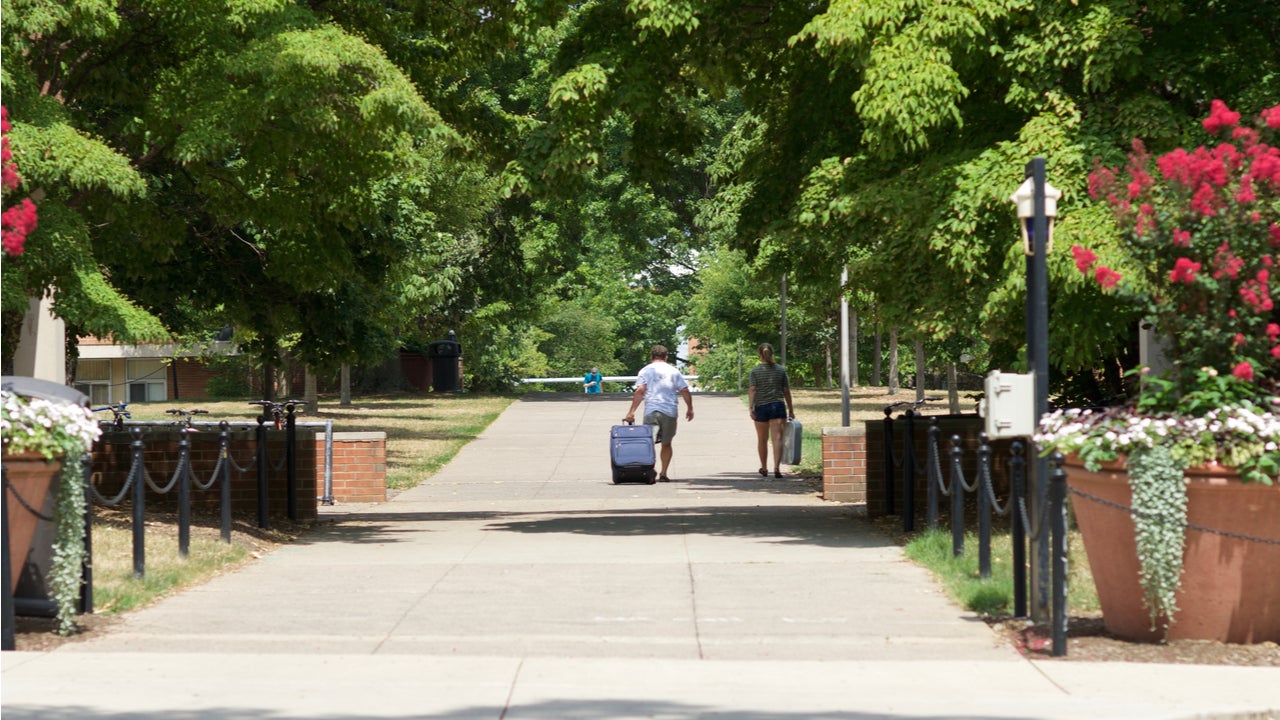What is work-study?

Work-study is a type of federal financial aid that allows students who demonstrate financial need to work part-time while enrolled in school. Your FAFSA results help determine your eligibility for this needs-based program. While you may use work-study pay for any expense, its primary goal is to help you pay for tuition and other college-related expenses.
Each college has its own form of work-study, but in many cases, jobs are available on campus through the university. In other cases, you may find a job at an off-campus agency or nonprofit.
How does work-study work?
Qualification for work-study is based on your family’s income, family size and other factors. You also have to secure the position as early as possible; work-study jobs are given on a first-come, first-served basis, so even eligible applicants will be out of luck if the jobs have all been doled out. And while some colleges may match you with a specific job, in many cases, you’ll have to apply and interview for your job on your own.
Work-study jobs are limited to 20 hours a week so students have enough time to manage their studies and extracurricular activities, though you may be allowed to work up to 40 hours during summer, winter and Thanksgiving breaks. Most jobs will only schedule between 10 and 15 hours a week.
Unlike other forms of financial aid, work-study comes with a regular paycheck. You can use the funds for tuition and living expenses or spend it all on weekend activities — though we recommend the former. This makes work-study positions more flexible than student loans and grants, which come with specific rules on what you can use the money for.
Qualifying for work-study
Only students with demonstrated financial need qualify for work-study. To find out if you’re eligible, you must fill out the Free Application for Federal Student Aid (FAFSA). The form will ask for your parent’s financial information, including their income and assets. If the university reviews the FAFSA and determines that your family can’t afford the cost of college, it’ll mark you as eligible for work-study.
To qualify, you must also have part-time or full-time student status, which usually means taking at least two or three classes each semester.
When you receive your financial aid award letter from the university, it will list the maximum amount of work-study you qualify for each semester, though many students end up working less than the maximum. Just because the letter says that you qualify for $3,000 worth of work-study doesn’t mean that you’ll earn that much.
Examples of work-study jobs
Common work-study jobs include:
- Tour guide.
- Campus bookstore employee.
- Library assistant.
- IT help.
- Tutor.
- Residence hall front desk assistant.
Some jobs may even be off campus at a nonprofit or community organization that has a contract with the university.
Pros and cons of work-study
While the federal work-study program has its perks, there are some potential downsides to consider. Here’s what to know about both the advantages and disadvantages.
Pros
- Gain relevant experience: The work-study program strives to match students with jobs that align with their course of study. This real-world experience can give you an advantage when you graduate and start looking for a job.
- Flexibility around your class schedule: Because work-study is designed specifically for college students, you’ll have an easier time finding a job that works with your schedule compared to an off-campus job you find on your own.
- Less competition: Because the work-study program is available only to a select group of students, you don’t have to worry about competing for a job with every other student at your school who’s looking.
- Proximity: While some work-study jobs are off campus, most are on campus, so you don’t have to worry about transportation costs or a lengthy commute.
Cons
- No guarantee of a job: While you may qualify for work-study, there may be more eligible students at your school than there are available jobs. Because work-study is awarded on a first-come, first-served basis, you may particularly struggle if you apply late.
- Low wages: Many work-study jobs pay minimum wage, so even if you get the maximum of 20 hours per week, it’s not going to make a big dent in your college expenses. You may be able to find a much more lucrative job off campus.
- More stress: It can be difficult for college students to balance their studies and their social lives, and adding a job into the mix can make it much more difficult. If you’re an incoming freshman, consider holding off on a job for at least a semester so you can get used to your new surroundings and schedule and determine how to make it all work.
How to apply for work-study
If you’re interested in working while attending school and believe that you qualify for work-study, take these steps:
- Fill out the FAFSA: Only students who fill out the FAFSA will qualify for work-study. Because work-study jobs are in high demand, it pays to complete and submit the FAFSA as soon as possible. The FAFSA opens yearly on Oct. 1 for the following school year. For instance, the FAFSA for the 2023-24 school year opened on Oct. 1, 2022. Submission deadlines can vary by state.
- Receive your award letter: After you’re accepted to college, you’ll receive a financial aid award letter showing if you’re eligible for work-study. These letters are usually sent out in the spring. The letter will state the maximum amount of work-study compensation you can receive.
- Find a job: While some universities will match you with a work-study job, others will require you to do the legwork yourself. You can apply for several different work-study jobs and pick one with your preferred hours and type of work. You may have to reapply every semester or every year, depending on the university policy.
The bottom line
While work-study won’t cover all of your college expenses, it can provide some help. A major pro is that you might gain relevant experience that helps you land a job after graduation. However, there are some potential drawbacks to consider — for example, most work-study jobs pay minimum wage. To see if you’re eligible for this program, complete the FAFSA if you haven’t already done so.
Frequently asked questions about work study
-
All work-study programs pay at least the federal minimum wage, although some may pay more — it all depends on the university.Unlike with other jobs, FICA taxes aren’t typically deducted from your paycheck. You usually receive a paycheck, but some schools may allow you to apply your earnings directly to your tuition and fees. If you use work-study to cover qualified educational expenses, you can even receive a special tax credit.
-
Having a work-study job won’t count against you when filling out the FAFSA. You’ll have to declare your work-study earnings on your taxes, but otherwise, it doesn’t count as regular income.
-
A work-study job is not inherently better or higher-paying than another kind of job. Some students can make more money waitressing, bartending or freelancing, especially if they can handle working more than 20 hours a week. Students with work-study jobs can work a maximum of 20 hours a week, but most work-study jobs are closer to 10 or 15 hours.With that said, many work-study jobs are low-stress and allow time for students to study. If you’re working at the front desk of a library, you can bring textbooks and complete some homework while getting paid. Plus, supervisors for work-study jobs are required to work around your class schedule, while bosses for other jobs may be less accommodating.While the pay from a work-study job doesn’t count against you on the FAFSA, pay from a regular part-time job will. This shouldn’t have a dramatic impact on your financial need status, but it is a consideration.
-
Any job you take on during college can boost your resume when it’s time to apply for an internship or a job after you graduate. But a work-study job can look particularly good if it’s in the field you want to pursue.If you land a work-study job that relates to your program, look for opportunities to gain the experience and expertise to make your resume stand out.




